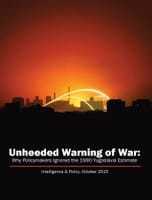Publication Details
By: Gregory F. Treverton and Renanah Miles, RAND Corporation
“Yugoslavia will cease to function as a federal state within one year and will probably dissolve within two. Economic reform will not stave off the breakup.”
With this stark language, the October 1990 US National Intelligence Estimate (NIE), Yugoslavia Transformed (NIE 15-90), forecast Yugoslavia’s disintegration. The NIE judged that the breakup would be violent and the conflict might spill over into adjacent regions. It included a paragraph on Bosnia—calling it “the greatest threat” of violence—but was more focused on Kosovo, where fighting seemed imminent.
Still, the NIE was stunningly prescient, unambiguously direct, and contained no dissenting footnotes. To the extent that policymakers saw and digested the estimate, intelligence succeeded in providing timely warning. Nevertheless, the NIE had no apparent impact on policy. It quickly leaked, leading veteran Washington Post editor Stephen Rosenfeld to observe, “It is a serious matter when the United States comes to a view that a friendly sovereign state may soon disappear … political chatter and newspaper talk are one thing and a formal verdict by a great power’s intelligence service another.”
What accounts for the lack of policy response? The case of the 1990 Yugoslavia NIE provides an opportunity to explore why intelligence went unheeded, particularly when the atmosphere surrounding the issue was not intensely political.
Editor’s Notes (July 2016): This is one of three monographs posted in CSI Books and Monographs that were produced during 2013–2015 by the RAND Corporation under CSI’s sponsorship. The principal author of all three is Gregory F. Treverton, who at the time of writing was a senior researcher at the RAND Corporation. The work represents one of the missions of the Center for the Study of Intelligence, which is to study important aspects of US intelligence support to policymakers and to derive lessons from such studies that may be applied in the present and the future. Originally published for official use only, these three studies have been reviewed for classification purposes and are made available here as wholly unclassified products. The other titles in this three-part posting are CIA Support to Policymakers: The First Callers—The President’s Daily Brief Across Three Administrations (2013) and CIA Support to Policymakers: The 2007 NIE on Iran’s Nuclear Intentions and Capabilities (2013).
These reports are based on reviews of unclassified documents, publicly available oral history interviews, and interviews with senior policymakers involved in the events they describe. All statements of fact, opinion, or analysis expressed in them are those of the author or authors. They do not necessarily reflect official positions or views of the CIA or any other US government entity, past or present. Nothing in the contents should be construed as asserting or implying US government endorsement of an article’s factual statements and interpretations.
